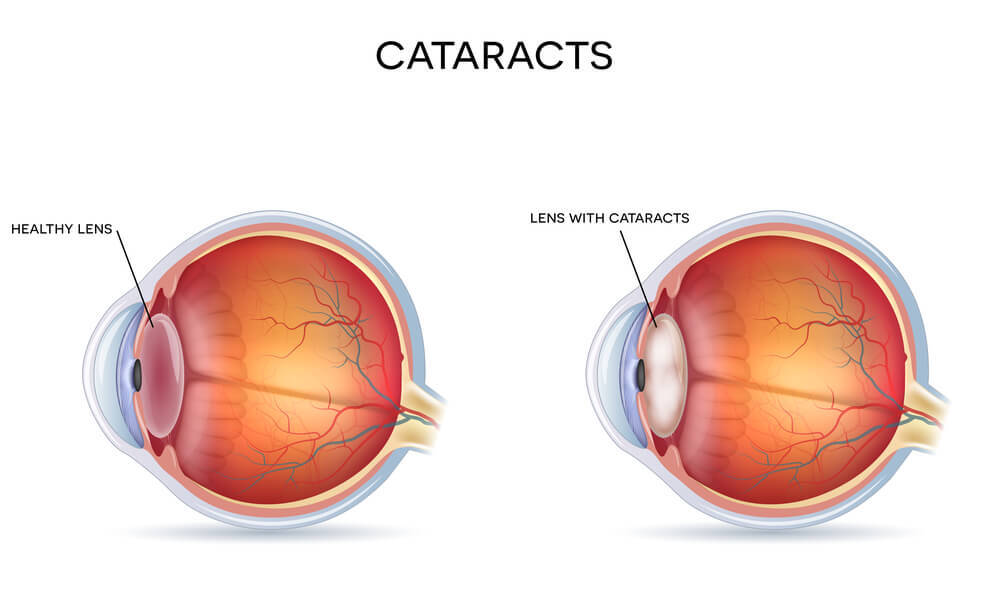What Age Is Best For Cataract Surgery?
Cataracts affect millions of Americans, with nearly 25.7 million people over age 40 currently living with this common eye condition. As you age, the natural proteins in the eye’s lens begin to break down and clump together, creating the cloudy vision characteristic of cataracts.
But when exactly is the right time to consider cataract surgery? Keep reading to learn more about what age is best for cataract surgery.
How Does Age Influence Cataract Development?

While cataracts are primarily an age-related condition, the timeline for their development varies significantly from person to person. Most people begin developing cataracts around age 40, though symptoms may not become noticeable until years later.
By age 60, the majority of people have some degree of lens clouding, but this doesn’t automatically mean surgery is necessary. Some patients in their 50s may experience significant vision impairment, while others in their 80s manage well with minor adjustments to their prescription.
The key factor isn’t your chronological age, but how cataracts affect your ability to perform daily activities and maintain your quality of life.
When Is It Time for Cataract Surgery?
The decision to undergo cataract surgery should be based on functional impairment rather than age alone. Consider these four essential questions to determine if you’re ready for cataract surgery:
Are your cataracts impacting daily activities?
If you’re struggling with reading, cooking, computer work, or other routine tasks due to dim, blurry, or yellowed vision, it may be time to consider surgery. Cataracts can make it difficult to see contrast clearly, affecting everything from reading medication labels to navigating stairs safely.
Is night driving becoming dangerous?
Cataracts often cause halos around lights and increased sensitivity to glare, making nighttime driving hazardous. If you’ve started avoiding evening activities or feel unsafe driving after dark, this is a strong indicator that surgery could significantly improve your safety and independence.
Are your outdoor activities affected?
Many patients notice increased sensitivity to bright sunlight and glare when spending time outdoors. This can impact everything from gardening to sports activities, reducing participation in hobbies you once enjoyed.
Have other management strategies stopped working?
In early stages, cataracts can sometimes be managed with updated glasses prescriptions, brighter lighting, or anti-glare sunglasses. When these accommodations no longer provide adequate vision improvement, surgery becomes the most effective solution.
The Benefits of Cataract Surgery

Cataract surgery has become one of the most commonly performed elective procedures, with an excellent safety record and remarkable success rates. The procedure involves removing your eye’s cloudy natural lens and replacing it with a clear artificial lens, known as an intraocular lens (IOL).
Research consistently demonstrates that cataract surgery offers benefits that extend far beyond improved vision. Studies show the procedure is associated with enhanced quality of life, reduced fall risk, fewer automobile accidents, and even lower long-term mortality rates.
These findings underscore the significant impact of vision on overall health and well-being. The surgery itself is performed as an outpatient procedure, typically taking less than 30 minutes.
Using advanced phacoemulsification techniques, your cataract surgeon creates tiny incisions and uses ultrasound technology to gently break up and remove the cloudy lens. The new IOL is then inserted through the same small opening, unfolding automatically to replace your natural lens.
When Cataract Surgery May Be Recommended Earlier
While functional impact remains the primary consideration, certain circumstances may warrant earlier surgical intervention:
Occupational Requirements
Professionals whose work demands precise vision, such as pilots, surgeons, or commercial drivers, may need surgery sooner to maintain safety standards and job performance.
Medical Complications
In some cases, cataracts can interfere with the diagnosis or treatment of other eye conditions, such as glaucoma or diabetic retinopathy, necessitating earlier removal.
Rapid Progression
Some cataracts, particularly those related to diabetes or trauma, may develop more quickly than typical age-related cataracts, requiring prompt attention.
Making an Informed Decision with Your Eye Care Team
The decision for cataract surgery should be collaborative. During your comprehensive eye examination at Complete EyeCare West, your eye doctor will assess not only the extent of your cataracts but also how they’re affecting your daily life and visual goals.
They will use advanced diagnostic technology to measure your cataracts precisely and determine the optimal timing for surgery. At this appointment, your eye doctor will also discuss your lifestyle needs, visual expectations, and IOL options to develop a personalized treatment plan.
Additionally, the consultation process includes discussing the procedure itself, preparation requirements, recovery expectations, and potential risks to ensure you have all the information needed to make an informed decision about your eye health.
When Will My Vision Improve after Cataract Surgery?

Cataract surgery recovery is typically swift and comfortable. Most patients notice improved vision within days, with complete healing occurring over several weeks.
You’ll use prescribed eye drops to prevent infection and reduce inflammation while your eye heals. The vast majority of patients experience dramatic vision improvement, often describing colors as more vibrant and vision as clearer than it has been in years.
Many find they can reduce their dependence on glasses, particularly for distance vision. If you opt for a premium IOL, you may even be able to eliminate your need for visual aids altogether.
Whether you’re 55 or 85, if cataracts are interfering with activities you value or compromising your safety, it may be time to consider surgery. By attending a consultation at Complete EyeCare West, your eye care team can determine the best approach for preserving and enhancing your vision, helping you maintain the active, independent lifestyle you deserve.
Don’t let cataracts limit your life. Schedule your appointment at Complete EyeCare West in Columbus, OH, today!







